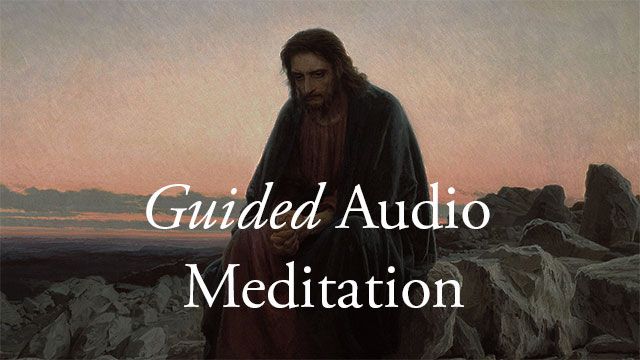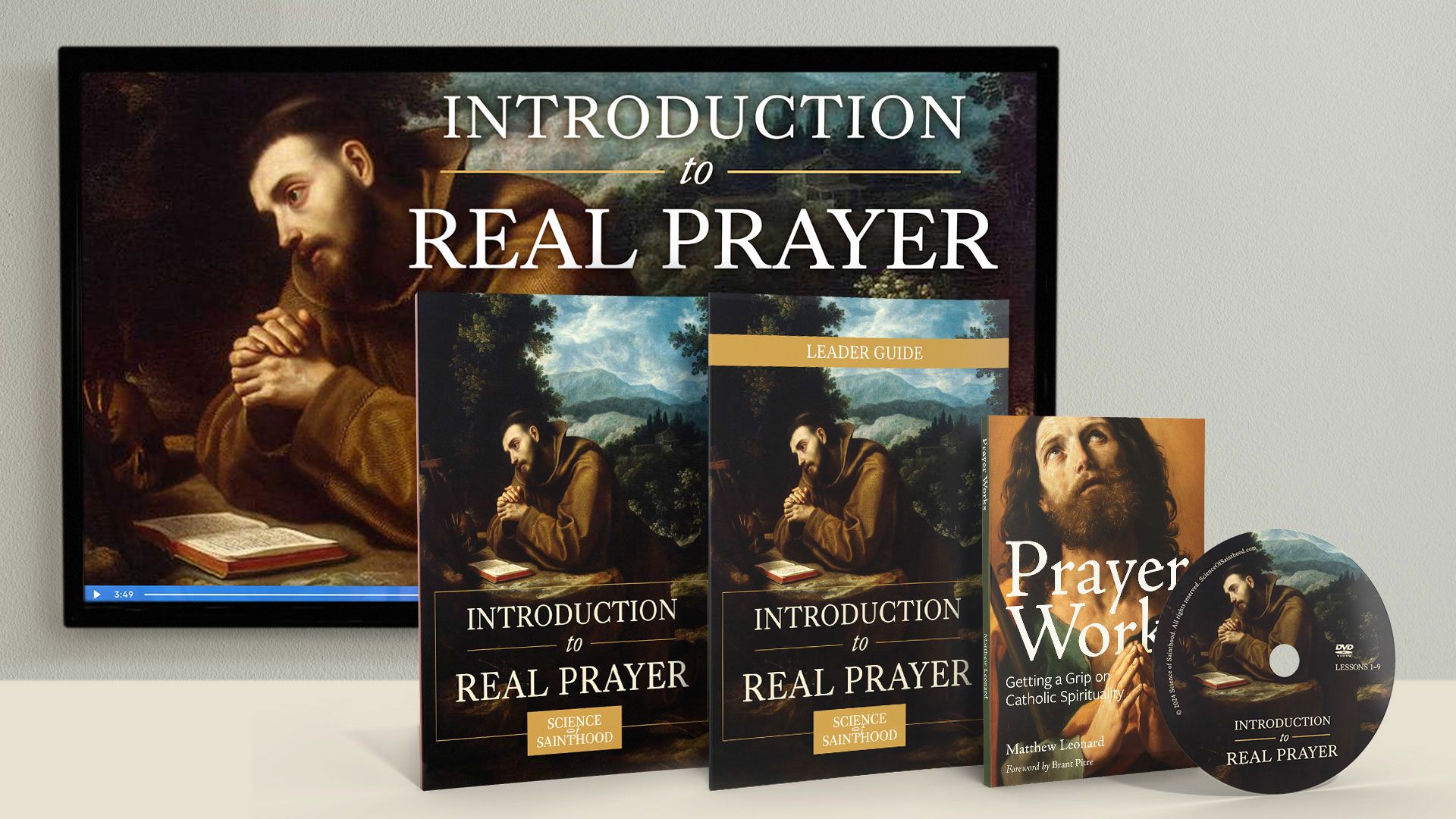Introduction to Real Prayer
Lesson 8
Overcoming Distraction & the Power of Silence
Start a Group with this Series!
(Or any of our Group Studies!)
It's Easy With our Group Starter Packs:
- NEW: DVD with Video & Guided Audio Meditations
-
Lifetime Online Access to the Video Study
-
Print Workbook (or Digital, if preferred)
-
Print Leader Guide (or Digital)
- Copy of Prayer Works: Getting a Grip on Catholic Spirituality (Print or Digital)
-
Certificates of Completion
-
Discounts on additional Workbooks
Ascend Toward God in the Science of Sainthood
"There is NOTHING like this in 'Catholic-land' online."
Get a Discount on the Science of Sainthood!Get the Book this Series is Based On!
(Available as e-book or Kindle, as well.)
Introduction to Real Prayer is based on Prayer Works: Getting a Grip on Catholic Spirituality by Matthew Leonard.
"Splendid!"
“Best book on prayer I have ever read!!”
“God has given this amazing man the ability to communicate how to be Catholic in a most loving and witty way.”
Savor Every Bit of this Powerful Series!
Grab a Print or Digital workbook and remember all you've learned!
- Detailed Lesson Reviews & Introductions
- Scripture for Lectio Divina
- Saint Passages
- Meditations
- Dedicated Space for Journaling & Notes
- Review & Discussion Questions
(Digital Workbook is available for immediate download.)
Workbook Review Question Answers
Lesson Eight
If you would like to purchase a workbook, you can do so here:
- INTERACTIVE DIGITAL WORKBOOK (immediate download)
- PRINT WORKBOOK from Science of Sainthood
- PRINT WORKBOOK from Amazon
- What are the two types of distractions and how do they differ?
Answer: The two types of distractions are voluntary and involuntary.
Involuntary distractions are thoughts that come into our head while we’re trying to focus on God. They’re not a big deal as long as we try our best to dismiss them when we realize they’re present.
Voluntary distractions, on the other hand, are those thoughts which we allow to hang around when they pop up, or only half-heartedly try to squash when they arise. When we entertain these thoughts, they become voluntary distraction.
- How can involuntary distractions actually help us?
Answer: In addition to the fact that we can turn them into a prayer by offering them back to the Lord (see Lesson 5), the Catechism says that “a distraction reveals to us what we are attached to.” In other words, they show us the things in our life that we’re most preoccupied with. They show us the things we need to deal with, or that we need to let go of.
- Why are voluntary distractions venial sin?
Answer: Voluntary distractions are venial sin because by entertaining them or even causing them, we are deliberately choosing them over God. We’re making an act of the will to do something that we know has a negative impact on our relationship with him. We’re choosing them even though we know they will distract us from him.
That said, don’t forget that once we deal with the source of the distraction—turning off the tv, stopping the incessant scrolling on our phone that fills our head with more stuff, or whatever it was that was always distracting us—the distraction that might still arise has now become involuntary and we can simply make an act of the will and offer it back to God. It’s no longer sinful.
- What’s the main reason we need to cultivate silence in order to grow in the spiritual life?
Answer: Put simply, if we’re not silent, we can’t hear God. As St. John of the Cross says, “The Father spoke one Word, which was his Son, and this Word he speaks always in eternal silence, and in silence must it be heard by the soul.”
On a deeper level, we need to cultivate silence because ultimately, we are made for the beautiful silence of God. In himself—in his inner life—God is silent. That’s one of the reasons why, as we progress in prayer from vocal prayer to meditation to contemplation, it all becomes more silent. We’re entering into the silent, loving dialogue of the Trinity. As paragraph 2717 of the Catechism says, “Contemplative prayer is silence, the ‘symbol of the world to come.’”
Remember that even Jesus sought silence so that He could powerfully commune with his Father. Along with many saints, he shows us the absolute necessity of silence to dialogue with God. As St. John of the Cross said, “What we need most in order to make progress is to be silent before this great God…for the language He best hears is silent love.”
- Why doesn’t the Devil want us to cultivate silence?
Answer: Silence forces us to be alone with ourselves and take a look in the mirror, so to speak. As St. Bernard of Clairvaux said, “Silence and the absence of noise in a certain manner force the soul to think of God and of eternal goods.” The Evil One doesn’t want that. He doesn’t want us seeking any kind of deeper meaning in life.
But it’s even more than that. The Devil hates silence because as we discussed, there’s a real sense in which silence is sacred; it’s connected with God. That’s why we automatically lower our voices when we walk into a beautiful Church. The knowledge of who dwells there demands a reverence that naturally translates into silence.
- What are some practical ways we can cultivate more silence and “constant prayer” in our lives?
Answer: We can start quieting ourselves down even before we enter into a time of prayer. For example, turning down the radio on the way to the adoration chapel or not watching television or incessantly scrolling on the phone right before bed so our mind is more calm upon waking. Another key is to examine what kinds of things we’re filling our minds with since it’s all food for the imagination. The point is to learn to make decisions based around how things will affect our ability to be silent with God.
























